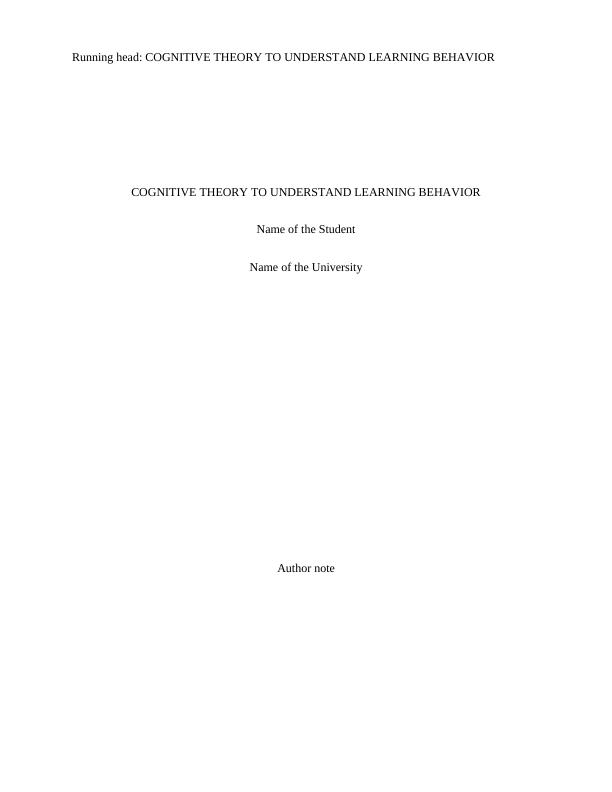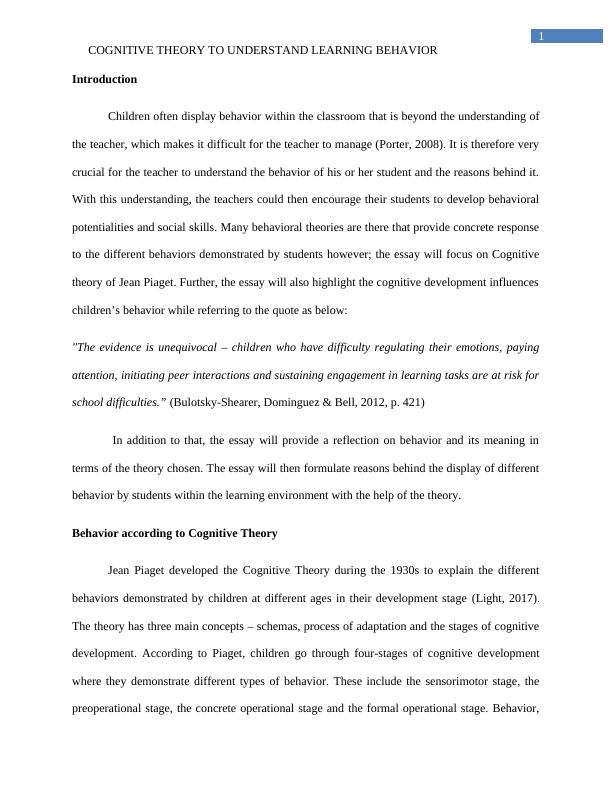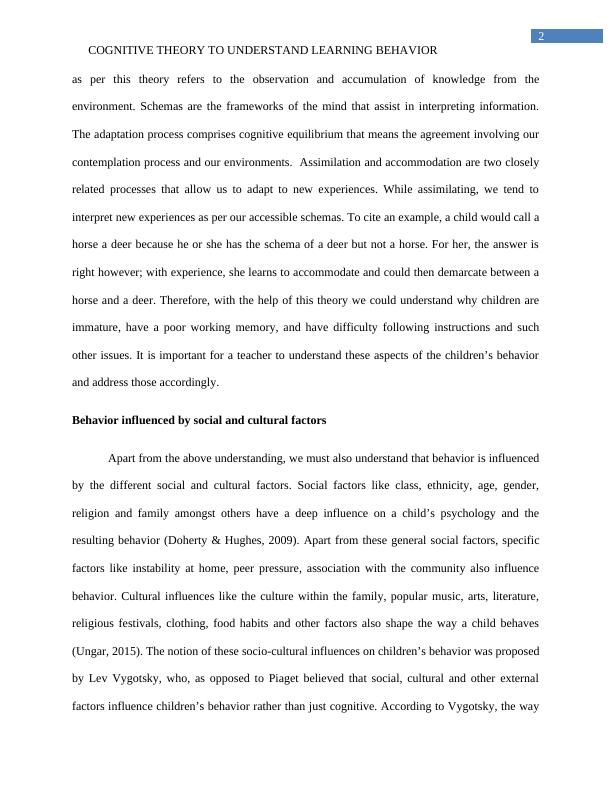Cognitive Theory to Understand Learning Behavior
Added on 2023-06-09
9 Pages2271 Words417 Views
Running head: COGNITIVE THEORY TO UNDERSTAND LEARNING BEHAVIOR
COGNITIVE THEORY TO UNDERSTAND LEARNING BEHAVIOR
Name of the Student
Name of the University
Author note
COGNITIVE THEORY TO UNDERSTAND LEARNING BEHAVIOR
Name of the Student
Name of the University
Author note

1
COGNITIVE THEORY TO UNDERSTAND LEARNING BEHAVIOR
Introduction
Children often display behavior within the classroom that is beyond the understanding of
the teacher, which makes it difficult for the teacher to manage (Porter, 2008). It is therefore very
crucial for the teacher to understand the behavior of his or her student and the reasons behind it.
With this understanding, the teachers could then encourage their students to develop behavioral
potentialities and social skills. Many behavioral theories are there that provide concrete response
to the different behaviors demonstrated by students however; the essay will focus on Cognitive
theory of Jean Piaget. Further, the essay will also highlight the cognitive development influences
children’s behavior while referring to the quote as below:
"The evidence is unequivocal – children who have difficulty regulating their emotions, paying
attention, initiating peer interactions and sustaining engagement in learning tasks are at risk for
school difficulties.” (Bulotsky-Shearer, Dominguez & Bell, 2012, p. 421)
In addition to that, the essay will provide a reflection on behavior and its meaning in
terms of the theory chosen. The essay will then formulate reasons behind the display of different
behavior by students within the learning environment with the help of the theory.
Behavior according to Cognitive Theory
Jean Piaget developed the Cognitive Theory during the 1930s to explain the different
behaviors demonstrated by children at different ages in their development stage (Light, 2017).
The theory has three main concepts – schemas, process of adaptation and the stages of cognitive
development. According to Piaget, children go through four-stages of cognitive development
where they demonstrate different types of behavior. These include the sensorimotor stage, the
preoperational stage, the concrete operational stage and the formal operational stage. Behavior,
COGNITIVE THEORY TO UNDERSTAND LEARNING BEHAVIOR
Introduction
Children often display behavior within the classroom that is beyond the understanding of
the teacher, which makes it difficult for the teacher to manage (Porter, 2008). It is therefore very
crucial for the teacher to understand the behavior of his or her student and the reasons behind it.
With this understanding, the teachers could then encourage their students to develop behavioral
potentialities and social skills. Many behavioral theories are there that provide concrete response
to the different behaviors demonstrated by students however; the essay will focus on Cognitive
theory of Jean Piaget. Further, the essay will also highlight the cognitive development influences
children’s behavior while referring to the quote as below:
"The evidence is unequivocal – children who have difficulty regulating their emotions, paying
attention, initiating peer interactions and sustaining engagement in learning tasks are at risk for
school difficulties.” (Bulotsky-Shearer, Dominguez & Bell, 2012, p. 421)
In addition to that, the essay will provide a reflection on behavior and its meaning in
terms of the theory chosen. The essay will then formulate reasons behind the display of different
behavior by students within the learning environment with the help of the theory.
Behavior according to Cognitive Theory
Jean Piaget developed the Cognitive Theory during the 1930s to explain the different
behaviors demonstrated by children at different ages in their development stage (Light, 2017).
The theory has three main concepts – schemas, process of adaptation and the stages of cognitive
development. According to Piaget, children go through four-stages of cognitive development
where they demonstrate different types of behavior. These include the sensorimotor stage, the
preoperational stage, the concrete operational stage and the formal operational stage. Behavior,

2
COGNITIVE THEORY TO UNDERSTAND LEARNING BEHAVIOR
as per this theory refers to the observation and accumulation of knowledge from the
environment. Schemas are the frameworks of the mind that assist in interpreting information.
The adaptation process comprises cognitive equilibrium that means the agreement involving our
contemplation process and our environments. Assimilation and accommodation are two closely
related processes that allow us to adapt to new experiences. While assimilating, we tend to
interpret new experiences as per our accessible schemas. To cite an example, a child would call a
horse a deer because he or she has the schema of a deer but not a horse. For her, the answer is
right however; with experience, she learns to accommodate and could then demarcate between a
horse and a deer. Therefore, with the help of this theory we could understand why children are
immature, have a poor working memory, and have difficulty following instructions and such
other issues. It is important for a teacher to understand these aspects of the children’s behavior
and address those accordingly.
Behavior influenced by social and cultural factors
Apart from the above understanding, we must also understand that behavior is influenced
by the different social and cultural factors. Social factors like class, ethnicity, age, gender,
religion and family amongst others have a deep influence on a child’s psychology and the
resulting behavior (Doherty & Hughes, 2009). Apart from these general social factors, specific
factors like instability at home, peer pressure, association with the community also influence
behavior. Cultural influences like the culture within the family, popular music, arts, literature,
religious festivals, clothing, food habits and other factors also shape the way a child behaves
(Ungar, 2015). The notion of these socio-cultural influences on children’s behavior was proposed
by Lev Vygotsky, who, as opposed to Piaget believed that social, cultural and other external
factors influence children’s behavior rather than just cognitive. According to Vygotsky, the way
COGNITIVE THEORY TO UNDERSTAND LEARNING BEHAVIOR
as per this theory refers to the observation and accumulation of knowledge from the
environment. Schemas are the frameworks of the mind that assist in interpreting information.
The adaptation process comprises cognitive equilibrium that means the agreement involving our
contemplation process and our environments. Assimilation and accommodation are two closely
related processes that allow us to adapt to new experiences. While assimilating, we tend to
interpret new experiences as per our accessible schemas. To cite an example, a child would call a
horse a deer because he or she has the schema of a deer but not a horse. For her, the answer is
right however; with experience, she learns to accommodate and could then demarcate between a
horse and a deer. Therefore, with the help of this theory we could understand why children are
immature, have a poor working memory, and have difficulty following instructions and such
other issues. It is important for a teacher to understand these aspects of the children’s behavior
and address those accordingly.
Behavior influenced by social and cultural factors
Apart from the above understanding, we must also understand that behavior is influenced
by the different social and cultural factors. Social factors like class, ethnicity, age, gender,
religion and family amongst others have a deep influence on a child’s psychology and the
resulting behavior (Doherty & Hughes, 2009). Apart from these general social factors, specific
factors like instability at home, peer pressure, association with the community also influence
behavior. Cultural influences like the culture within the family, popular music, arts, literature,
religious festivals, clothing, food habits and other factors also shape the way a child behaves
(Ungar, 2015). The notion of these socio-cultural influences on children’s behavior was proposed
by Lev Vygotsky, who, as opposed to Piaget believed that social, cultural and other external
factors influence children’s behavior rather than just cognitive. According to Vygotsky, the way

End of preview
Want to access all the pages? Upload your documents or become a member.
Related Documents
Cognitive Developmental Theory: Piaget's Theory and Recent Researchlg...
|9
|2247
|168
ECDV 110 - Child Developmentlg...
|7
|1554
|82
Analyzing Theories, Models, and Principles of Communicationlg...
|17
|733
|43
Cognitive Development and Defining Abnormality in Psychologylg...
|13
|2459
|198
Personal Reactions and Observations on Chosen Videolg...
|4
|679
|367
Learning, Teaching and Assessment Assignmentlg...
|13
|2720
|73
